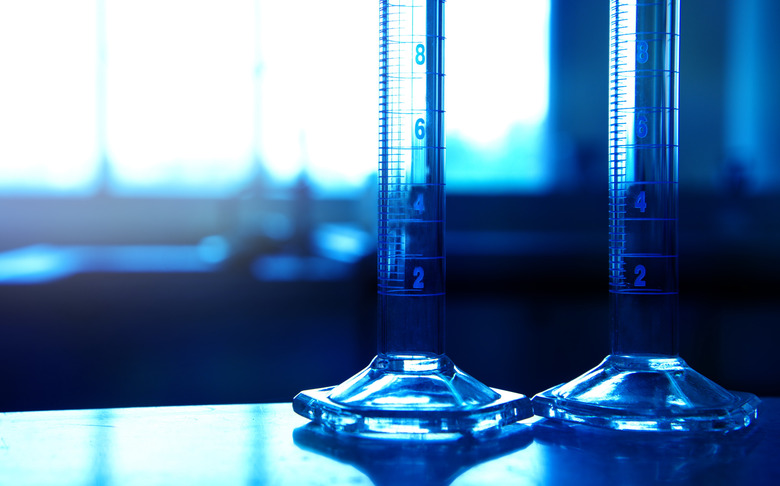The Difference Between A Beaker & A Graduated Cylinder
Both graduated cylinders and beakers are pieces of laboratory glassware that have a specific function. Graduated cylinders typically are more accurate at reading the volumes of the liquid inside. Beakers are better for stirring and mixing liquids.
Beaker
Beaker
A beaker is a simple laboratory piece of glassware that resembles a coffee mug without the handle. On its side are markings denoting approximately how much liquid is inside. They are generally cylindrical in shape with a flat bottom, a wide mouth and a small turned-out lip for pouring.
Uses for a Beaker
Uses for a Beaker
Laboratory beakers are generally used for stirring, mixing and heating liquids found in laboratory settings.
Graduated Cylinder
Graduated Cylinder
A graduated cylinder is a standard piece of laboratory glassware used to measure the volume of an object or amount of liquid. As its name indicates, it is a glass cylinder with marks along the side similar to those on a measuring cup. The volume is read by looking at the top of the fluid from the side and reading the mark on the glass from the lowest portion of the lens-like meniscus of the liquid.
Uses for a Graduated Cylinder
Uses for a Graduated Cylinder
Graduated cylinders are specifically designed to make accurate volume measurements. By taking a reading before inserting an object in the graduated cylinder and then after inserting it, one can tell the volume of the object from the difference of the two readings and subsequently calculate its density.
Differences
Differences
According to Indigo Instruments, the accuracy of a beaker is about 10 percent. A graduated cylinder is accurate to 1 percent of its full scale.
Graduated cylinders have a smaller width than beakers. This is why a beaker is better for stirring and mixing liquids.
Cite This Article
MLA
Wolfe, Kari. "The Difference Between A Beaker & A Graduated Cylinder" sciencing.com, https://www.sciencing.com/difference-between-beaker-graduated-cylinder-5581202/. 13 March 2018.
APA
Wolfe, Kari. (2018, March 13). The Difference Between A Beaker & A Graduated Cylinder. sciencing.com. Retrieved from https://www.sciencing.com/difference-between-beaker-graduated-cylinder-5581202/
Chicago
Wolfe, Kari. The Difference Between A Beaker & A Graduated Cylinder last modified March 24, 2022. https://www.sciencing.com/difference-between-beaker-graduated-cylinder-5581202/
